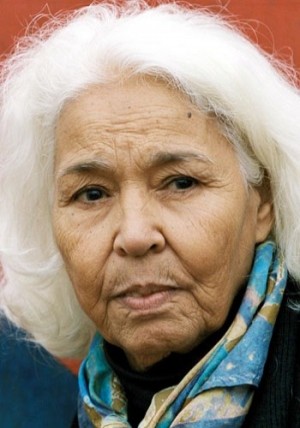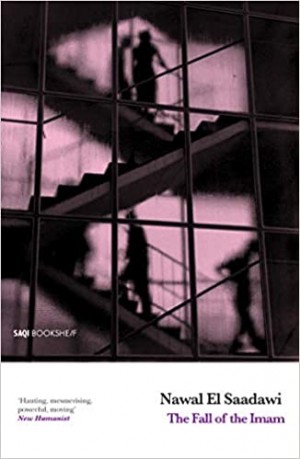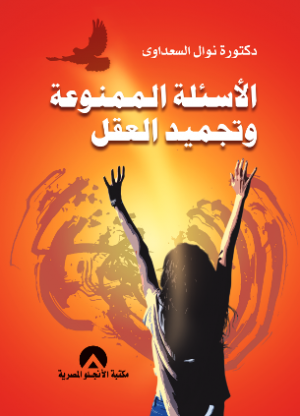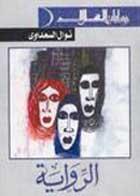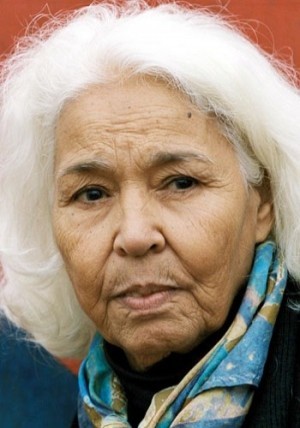27 October 1931 – 21 March 2021
Nawal el-Saadawi also spelt Nawal Alsaadawi or Saadawy doctor, writer and militant advocate of Arab women's rights - was an internationally renowned Egyptian writer and feminist. Born in 1931 in Kafr Thala, a village on the banks of the Nile, Saadawi has always been controversial. She was an Egyptian secularist, feminist, humanitarian, author, activist, physician, and psychiatrist. She wrote many books on the subject of liberation of women, paying particular attention to ban the practice of female and male circumcision. She is considered to have been an apostate by most Muslims. She was described as "the Simone de Beauvoir of the Arab World" and as "Egypt's most radical secularist feminist woman".
She was founder and president of the Arab Women's Solidarity Association and co-founder of the Arab Association for Human Rights. In 2004, she won the North–South Prize from the Council of Europe. In 2005, she won the Inana International Prize in Belgium and in 2012, the International Peace Bureau awarded her the 2012 Seán MacBride Peace Prize.
Despite the considerable limitations facing rural women of her generation, she studied psychiatry in Cairo, qualified as a doctor and became Egypt's Director of Public Health in 1972. However, due to her writing and her political activities she was later dismissed from her post.
From then on, there was no respite: imprisonment under the late President Anwar Sadat in 1981 was the culmination of the long struggle she had fought for Egyptian women's social and intellectual freedom. In 1992 her name appeared on a death list issued by an Islamic fundamentalist group, prompting her to flee Egypt for five years. When Saadawi was seven years old, she "felt there was something wrong on earth and in heaven. At that age, I was ready to fight, to die for my country but I ended up in jail.” .
Despite her books being banned, and the period of detention under the Sadat regime, she continues to write about the problems and struggles of Arab women.
She has gained a considerable reputation in the English-speaking world through her books The Hidden Face of Eve, a study of women in Arab society, and Woman at Point Zero, a novel.
Nawal Saadawi featured in Writers Who Changed History
Published May 2024 by DK (Dorling Kindersely) and James Naughtie.
The volume includes, for example, Charlotte Bronte, Jane Austen, Mark Twain, Dostoevsky, Charles Darwin, Rene Descartes, James Joyce, John Steinbeck, Edgar Allan Poe, George Orwell and others .. Among the authors appearing on the cover are Nawal El Saadawi, William Shakespeare , Virginia Woolf and Samuel Beckett.
James Naughtie wrote in the introduction: We read what these great writers wrote, because we need them,to protect and enrich human civilization.
A selection of her works are :
The Hidden Face of Eve
This is a personal and often disturbing account of growing up into womanhood in the Islamic world. The author ranges over a host of topics - from sexual aggression against female children and the circumcision of young girls, to prostitution, sexual relationships, marriage and divorce. She relates women's position in the Middle East to the struggles between the left and right in Islam, and shows how the political priorities of Western and Third World women differ.
God Dies by the Nile
First published in Arabic in Beirut in 1974, under the title The Death of the Only Man on Earth; and first published in English in 1985.
Zakeya, who lives in a village on the banks of the Nile, is a poor, illiterate peasant woman whose relatives are cynically exploited and victimized by the mayor and his local cohorts. Her story is a simple, tragic one of a petty tyrant's determination to satisfy his illicit sexual lust for her two young nieces, a story which culminated in her ultimate revenge.
This new novel by Nawal el Saadawi illustrated the class dimension of the oppression of women, as well as of their families. It can also be seen as a metaphor for the Sadat regime and landlords' oppression in general.
Memoirs of a Woman Doctor
The Author's Note:
London, June 1987
"I wrote Memoirs of a Woman Doctor thirty years ago when, as a young woman in my twenties, I had just graduated from the School of Medicine in Cairo. It expressed my feelings and experiences as a woman who was a doctor at work, but still performed the roles of a wife and a mother at home.
Memoirs first appeared in serialized form in the Egyptian magazine Ruz al-Yusuf in 1957. It had a great impact in Egypt and in the Arab world. Some critics regarded it as a revolutionary feminist novel which revealed the double exploitation of Egyptian women - both their general, social oppression and their private oppression through the institution of marriage. But the book was also controversial. Ruz al-Yusuf deleted sections of the complete work from the serialized version on the demand of the government censor. I then tried to have the book published without deletions but publishers refused to print it without censoring it. As I was young and inexperienced and eager to see the book in print, I allowed it to be published with the deletions.
Since that time, the novel has been frequently reprinted both in Cairo and in Beirut. But it has never appeared in its entirety because I have lost the original manuscript.
Despite these limitations, I still consider Memoirs, incomplete as it is in the present edition, as a fair description of the moral and social position of women in that period. Some people believe that Memoirs is autobiographical, but although many of the heroine's characteristics fit those of an Egyptian woman such as myself, active in the medical field in those years, the work is still fiction. It is one thing to write a novel, and another to write one's autobiography.
At the time I had not read any feminist literature on women's struggle or on women's status in contemporary society - this only came later - but although I have subsequently written many novels and short stories which may be more sophisticated, I still consider Memoirs like a first daughter, full of youthful fervor and expressing a reality which is still relevant today. It is a simple, spontaneous novel in which there is a lot of anger against the oppression of women in my country, but also a great deal of hope for change, for wider horizons and a better future."
Two Women in One
First published in 1975 in Beirut
Two Women in One is the story of Bahiah Shaheen, an 18-year old medical student and daughter of a prominent Egyptian public official. She finds the male students in her class rough, coarse and alien. Her father, too, seems to belong to a race apart, and the young woman has long ceased to be surprised at not being her real self in his presence.
But what, she wonders, is this real self? Of one thing she is certain: it is not the hard-working, well-behaved medical student from the comfortable middle-class background familiar to all who know her.
One day she is looking at a painting, a stranger comes up and engages her in conversation. This proves to be the beginning of Bahia Shaheen's road to self-discovery and the start of her realization that one can find fulfillment in one's life.
Two Women in One is not merely the story of Bahiah Shaheen. It is also the story of countless women in the Third World, their hopes and ambitions, and their quest for emancipation and dignity. It is a telling reminder for women everywhere that hope should never yield to despair, that the future does hold a brighter promise.
We thank our member Aida Nassar for helping in publishing this page
Saadawi's "The Novel" was our Book selection for October 2005.
